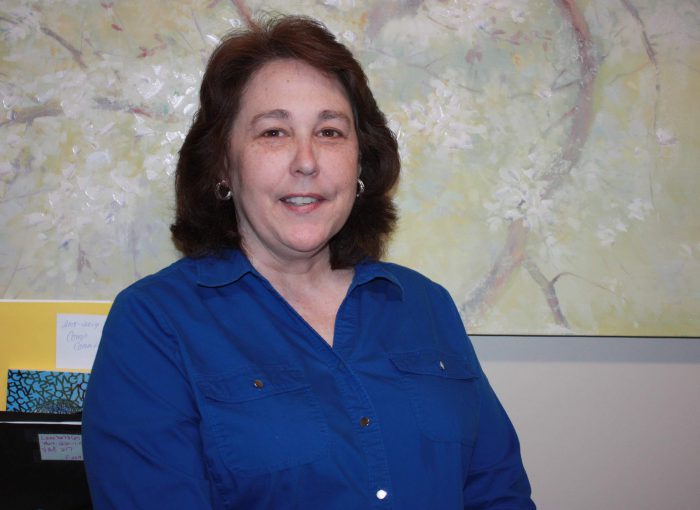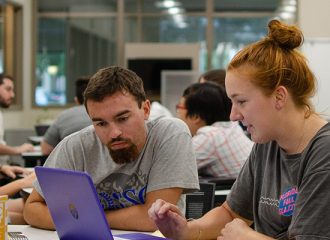by Jordan Beeker
There are many challenges incoming freshmen face coming into college, and for these students, it can sometimes feel like being a small fish entering a huge pond. Between the different expenses for meal plans, dorms, classes, and textbooks, as well as being exposed to a new environment and social circles, such as fraternities and clubs, the journey to finding one’s true identity can be daunting. Your high school teachers, parents, or old friends may have intimidated you about the perils of strict professors, sharing a bathroom with three other people, or the dangers of credit card debt. These experiences have the potential to be scary for anyone entering the next stage of life, but rest assured, as an upperclassman, I’m here to share some tips from a UCF professor, who works hard to help freshmen succeed.
Adele Richardson, an advisor and professor in the Department of Writing and Rhetoric, agreed to sit down with me to talk about what students should expect in the wake of a new semester, specifically freshman year. As an Instructor, who has received several prestigious UCF teaching awards, she has witnessed many of the struggles first year students face and empathizes with them saying “…it’s a whole new world, and it’s very overwhelming here. It’s like moving away from home to a city. I try to usher students through it with a little leniency.”
As someone who was raised in the suburbs, I experienced first hand how tough it can be to find one’s away around a city for the first time, and make new friends, and juggle a class schedule. Occasionally, it can be overwhelming. But, it’s a learning process and eventually you’ll meet professors as understanding as Professor Richardson. Most of the time, your instructors aren’t sadistic, and they would like to see you succeed more than fail.
She also knows how hard it can be to adapt to the lifestyle of a student living on campus. She says, “…if someone came from a very small neighborhood and they come here, and there’s football in the fall, Greek Life, and other activities, depending on their home life, they might not have been brought up in a way that protects them from their attention being so divided.”
One of the more enjoyable aspects of the college experience is the variety of classes to choose from. The first couple of years, most students take general education courses, or simply “gen-eds,” where students are required to take certain classes to ensure a basic understanding of specific principles and gain a well rounded education. Although this may sound like drudgery, it is actually the only point in one’s academic career where a student can take courses that may differ from the upper level ones later on in their major. Even Professor Richardson stresses the importance of “engaging with your classes even if you don’t think you’re going to like it. I am a first-year advisor, and I’m astonished at the students that take gen-eds and actually dismiss them. How do you know you will or will not like it? Maybe, Anthropology is your thing, but you don’t know because you’re not coming into it with an open mind.”
Truthfully, general education courses may not hold the coveted answers on how to gain admission into law or medical schools, but they will most certainly expand your thought processes. After all, college is more than friends, parties, syllabi, and morning classes. It’s about pushing the envelope, challenging outmoded beliefs, and stepping out of one’s comfort zone.
Professor Richardson encourages students to, “put forth genuine effort, because that’s how I know that kid’s going to be successful, because they’re willing to try new things. Don’t be afraid to ask.” It’s as simple as applying yourself. No one is perfect, and there is zero pressure to be, even for biology majors. The bulk of trying rests in relentless determination and inquisitiveness. The rest is sure to follow. Professor Richardson recommends that you, “be yourself and you will always be successful.”
The biggest reality check I needed when moving away to college was the fact my parents were no longer capable of making every decision for me. Sure, parents are always a phone call away, but their advice is only as good as their understanding of the situation. They won’t be there to help you convince that one particular professor to allow you to turn in your homework late, or extinguish any squabbles with your dorm mates concerning privacy or cleanliness. And, ultimately, they can’t choose the career, which will make you happiest. That decision rests upon your shoulders.
Professor Richardson wasted no time in sharing her greatest tip for the tadpoles wading into a massive pond. “The last big piece of advice I would give a freshman student is that college is not about what your parents want you to be, but what you want to be. It will always be work if you do something someone else wants you to do.”
Passion is the one tool she emphasizes that will fuel your dreams. It is the one thing that will get you through the late night study sessions, or the long periods of time away from your significant other. When I asked Professor Richardson what drove her passion for teaching, it was no surprise that she said, “it’s fun.”
As a current upperclassman and former resident of Libra, who has endured the wave of new students, dorm life, and rush events on campus, the first semester of college can be a full plate to say the least. Some of you will make friends faster than you’d ever thought possible, and some of you will lose friends you’ve had for years. Not only that, but new ideas and ways of thinking may challenge the traditional viewpoints you might have inherited from your parents or previous environments. This is your journey, your college experience. Make it all that you can and remember, your professors are here to help you succeed.





